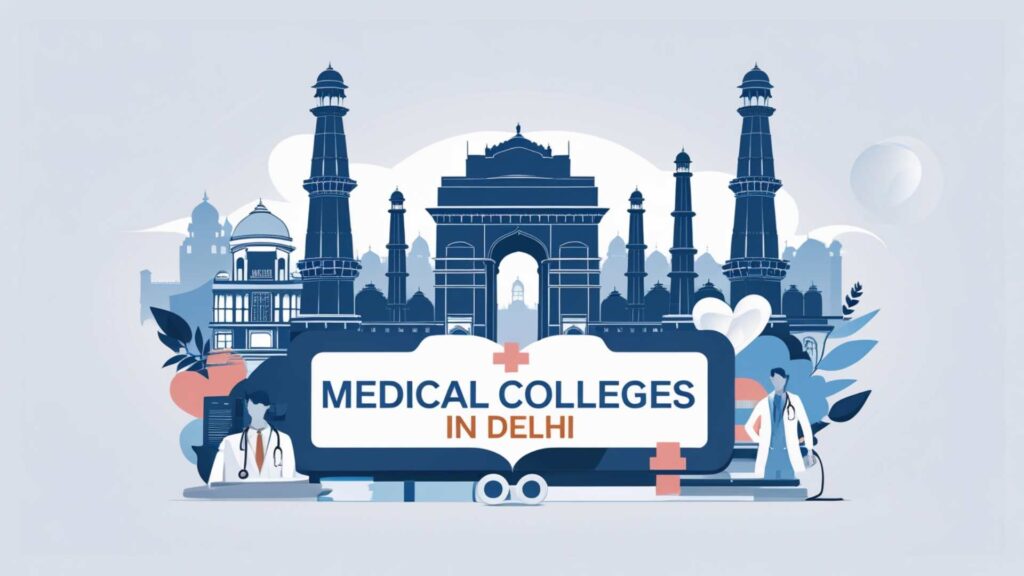As the lively capital of India, Delhi encourages many young people to pursue careers in medicine. Many of the most famous medical schools are found here which makes the area competitive and a great place for future doctors to grow. Thousands of students across India are drawn to medical colleges in Delhi due to their technological progress, good faculty and clinical opportunities.
The process of admission, leafing through the fees structure and selecting the right college may be tough. This guide tries to break down information about top medical colleges in delhi, their admission and fee details and what is special about each college for the academic year 2025-26. This article is designed to give both starting high school graduates and experienced hopefuls the facts needed to choose and begin a fulfilling medical career in Delhi.
Understanding the Medical Education Landscape in Delhi
- The NEET Nexus: The Sole Gateway to MBBS: Getting into MBBS courses in Delhi is mainly based on the results of the National Eligibility cum Entrance Test (NEET UG) like in other parts of India. This exam decides if someone is qualified and how they will be ranked for admission in both the All India Quota (AIQ) and State Quota (85%) seats in government and private medical colleges.
- Government vs. Private: A Tale of Two Fee Structures: There are plenty of government as well as private medical colleges in Delhi. Because they are funded by the government, government colleges charge lower tuition, making them very popular. Even though private colleges provide superior facilities, they charge a much higher amount for tuition.
- AIQ vs. State Quota: Understanding the Seat Distribution: The 15% All India Quota (AIQ) seats are meant for candidates from any part of the country and have their counselling organized by the Medical Counselling Committee (MCC). Delhi state authorities handle the counselling for the remaining State Quota seats which are reserved for candidates from Delhi.
- Affiliation and Accreditation: Pillars of Quality: Most medical colleges are affiliated with the University of Delhi (DU) or Guru Gobind Singh Indraprastha University (GGSIPU). The awarding of medical degrees by institutions is allowed only by the National Medical Commission (NMC), so standards are upheld at a national level.
- Beyond Academics: Research and Clinical Exposure: Apart from academics, medical colleges in Delhi allow students to come across a huge number of real medical cases through their attachment to large hospitals. A lot of these centers emphasize research, allowing students to be involved in making groundbreaking changes in medicine.
- Ensuring Fair Chances: UWC India’s admission follows the reservation guidelines set by the Government of India and the Government of Delhi for Scheduled Castes (SC), Scheduled Tribes (ST), Other Backward Classes (OBC), Economically Weaker Sections (EWS) and Persons with Disabilities (PwBD).
List of Top Medical Colleges in Delhi
1. All India Institute of Medical Sciences (AIIMS), Delhi
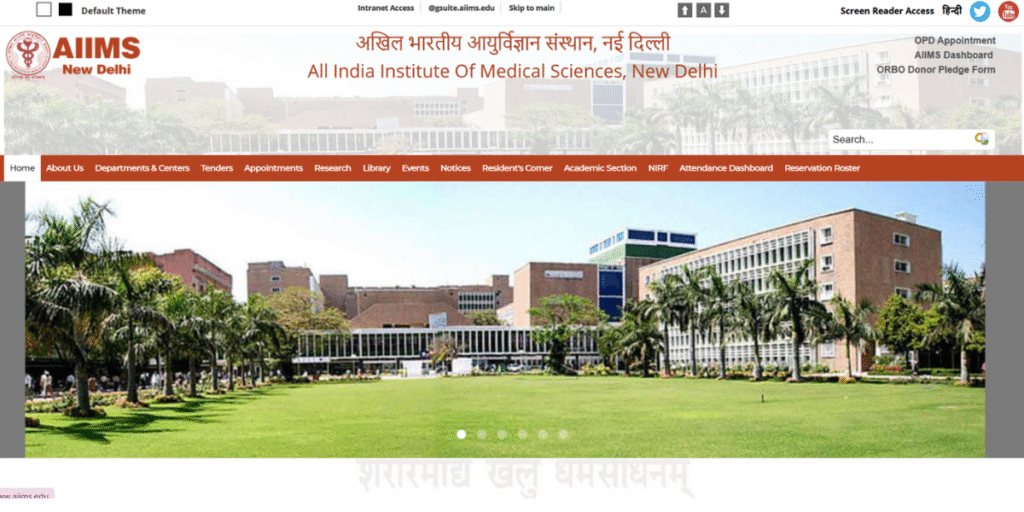
Consistently, people rank AIIMS Delhi at the top of medical studies in India, based on its academic achievements, innovative exploration, and wide patient care. Since 1956, it has worked independently from the Ministry of Health and Family Welfare, Government of India. The MBBS program at AIIMS Delhi is highly competitive, so the best and brightest students in India apply for entry through a different entrance exam (until 2019, now through NEET).
Leading medical experts teach at the institute which features the best equipment and treats a high number of patients, giving students excellent clinical experience. Because of the emphasis on research and innovation, plus an active alumni network, AIIMS Delhi is widely regarded as the top choice among Medical Colleges in Delhi for students interested in high-quality medical studies. Its contributions also align with the broader healthcare landscape shaped by leading Pharma Companies in India, reinforcing its role in advancing public service and affordability in medical education and practice.
- Key Highlights:
- Consistently ranked #1 in India.
- Autonomous institution with a focus on research.
- Excellent faculty and advanced infrastructure.
- High patient load for clinical experience.
- Minimal fees.
- Affiliation: Autonomous (under Ministry of Health & Family Welfare, Govt. of India)
- MBBS Seats: 132 (including 7 for foreign nationals)
- Approximate Fees (MBBS): ₹6,000 – ₹7,000 (total for the entire course, highly subsidized)
- NEET Cut-off (Previous Year Trends – General Category All India Rank):
- 2024: Around 47
- 2023: Around 57
- 2022: Around 61
- USP: Unmatched prestige, and an extremely low fee structure due to its autonomous government status.
2. Maulana Azad Medical College (MAMC), Delhi
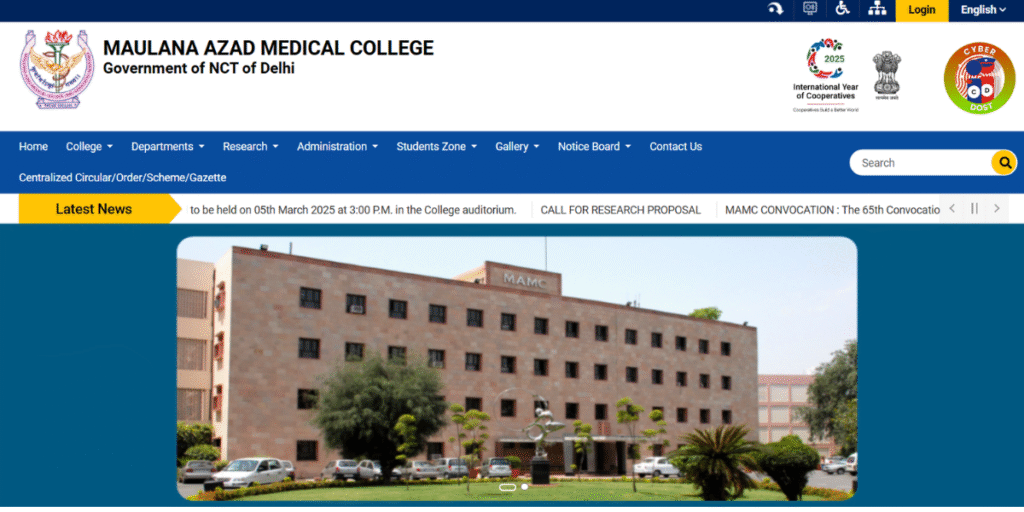
Maulana Azad Medical College (MAMC) was established in 1959 and is known as one of the most prominent government Medical Colleges in Delhi, affiliated with the University of Delhi. Located in central Delhi, MAMC is associated with four large hospitals: Lok Nayak Hospital, Sushruta Trauma Centre, Guru Nanak Eye Centre, and Maulana Azad Institute of Dental Sciences, which offers a rich environment for clinical studies.
People appreciate the college because of its qualified teachers, an academic program that includes both learning and practice, and a lively student community. Many leading medical professionals and researchers in the country and overseas have come from the MAMC. Its convenient place in Delhi and its association with Delhi University are reasons why students choose it.
- Key Highlights:
- Highly reputed government college.
- Affiliated with Delhi University.
- Associated with multiple large hospitals for clinical training.
- Strong alumni network.
- Affordable fees.
- Affiliation: University of Delhi
- MBBS Seats: 250
- Approximate Fees (MBBS): ₹11,000 – ₹12,500 (total for the entire course, highly subsidized)
- NEET Cut-off (Previous Year Trends – General Category All India Rank): Expected to be around 100-150 for AIQ, higher for State Quota.
- USP: Excellent academic environment with massive clinical exposure due to its attachment to multiple high-volume hospitals.
3. Lady Hardinge Medical College (LHMC), Delhi
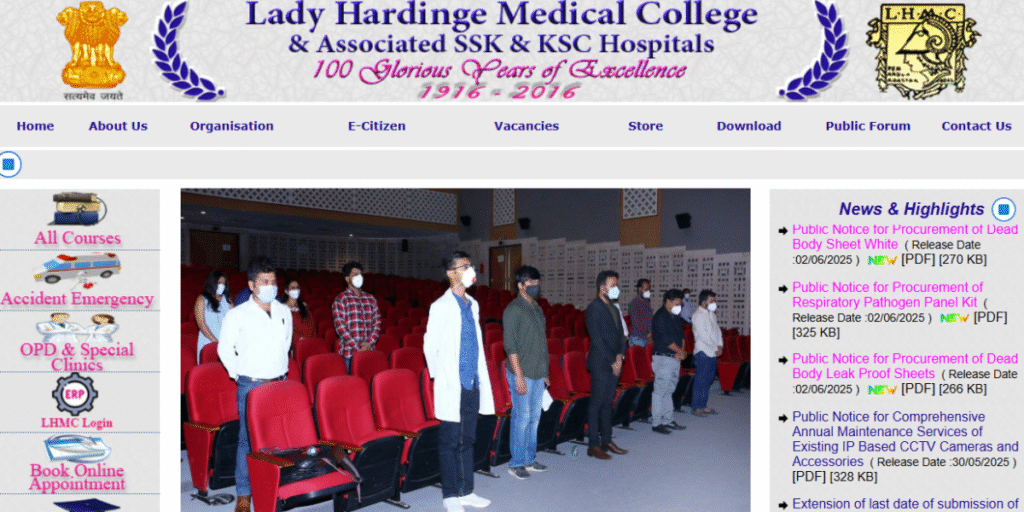
Opened in 1916, Lady Hardinge Medical College (LHMC) is one of many great all-female medical colleges in Delhi, linked to the University of Delhi. Established to provide education for women in medicine, it has had a major role in making women more powerful in the medical field. LHMC works together with two hospitals, Smt.
Sucheta Kriplani Hospital and Kalawati Saran Children’s Hospital, to ensure students experience many obstetrics, gynecology and pediatrics cases. The college delivers an outstanding education, ensures every female student feels supported and continues to mold high achieving women doctors. As a branch with important medical history, specialized in treating women, it draws many women who want to become doctors.
- Key Highlights:
- Historic all-girls medical college.
- Affiliated with Delhi University.
- Specialization in women’s and children’s health.
- Dedicated faculty and supportive environment.
- Affordable fees.
- Affiliation: University of Delhi
- MBBS Seats: 240
- Approximate Fees (MBBS): ₹7,000 – ₹7,500 (total for the entire course, highly subsidized)
- NEET Cut-off (Previous Year Trends – General Category All India Rank for Girls): Expected to be around 200-300 for AIQ, higher for State Quota.
- USP: Unique focus on empowering women in medicine and specialized training in women’s and child health, making it an excellent choice for female aspirants.
4. Vardhman Mahavir Medical College (VMMC) & Safdarjung Hospital, Delhi
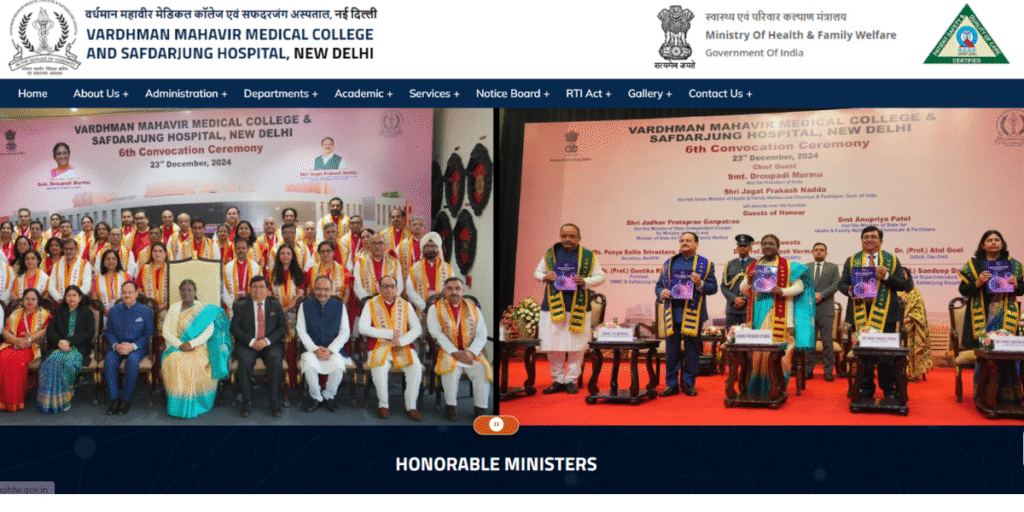
Vardhman Mahavir Medical College (VMMC), established in 2001, makes up one of the main government medical colleges in Delhi and is linked to the major tertiary care hospital Safdarjung Hospital. Guru Gobind Singh Indraprastha University (GGSIPU) is the affiliated institution of VMMC. The college greatly profits from its relationship with Safdarjung Hospital, as students get to see and learn about different medical and surgical specialties because of the large number of patients at the hospital.
VMMC offers advanced laboratories, excellent simulation centers, dedicated teachers and puts emphasis on giving students hands-on experience. Being recently founded allows the college to use the latest facilities which makes it popular among students.
- Key Highlights:
- Associated with Safdarjung Hospital, a large tertiary care center.
- Affiliated with GGSIPU.
- Modern infrastructure and facilities.
- Extensive clinical exposure.
- Government-subsidized fees.
- Affiliation: Guru Gobind Singh Indraprastha University (GGSIPU)
- MBBS Seats: 170
- Approximate Fees (MBBS): ₹2.0 – ₹2.5 Lakhs (total for the entire course, subsidized)
- NEET Cut-off (Previous Year Trends – General Category All India Rank): Expected to be around 100-200 for AIQ, higher for State Quota.
- USP: Direct access to a massive patient population and a wide spectrum of cases at Safdarjung Hospital, offering unmatched practical learning.
5. University College of Medical Sciences (UCMS), Delhi
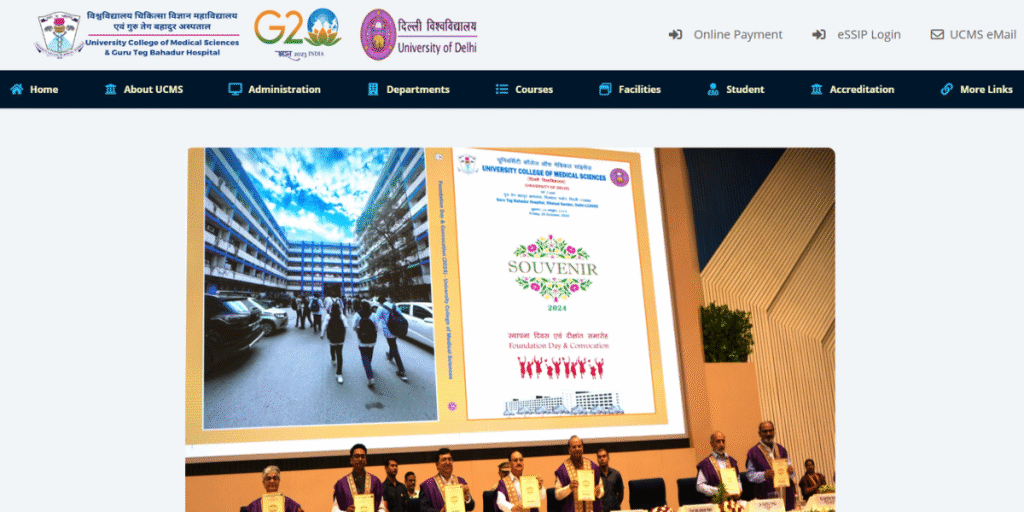
The University College of Medical Sciences (UCMS) was established in 1971 and has become a well-known government medical college in Delhi, linked to the University of Delhi. It is related to Guru Teg Bahadur Hospital (GTB Hospital), a major government institution in East Delhi which caters to a large number of patients and has different cases to study.
The school is acknowledged for excellent academic courses, uncommon teaching approaches, focus on research, and commitment to helping the community. The college is designed to support learning with excellent labs, a wide range of digital books and resources, superior lecture rooms, and a faculty focused on the all-round development of its students. Being closely linked to a high-volume hospital accounts for why many trust it among the top Medical Colleges.
- Key Highlights:
- Reputable government college.
- Affiliated with Delhi University.
- Attached to GTB Hospital for clinical training.
- Emphasis on research and community health.
- Relatively affordable fees.
- Affiliation: University of Delhi
- MBBS Seats: 170
- Approximate Fees (MBBS): ₹1.4 Lakhs – ₹1.5 Lakhs (total for the entire course, subsidized)
- NEET Cut-off (Previous Year Trends – General Category All India Rank): Expected to be around 300-500 for AIQ, higher for State Quota.
- USP: Strong academic foundation and a focus on integrating medical education with community health needs through its association with GTB Hospital.
6. Dr. Baba Saheb Ambedkar Medical College & Hospital (BSAMCH), Delhi
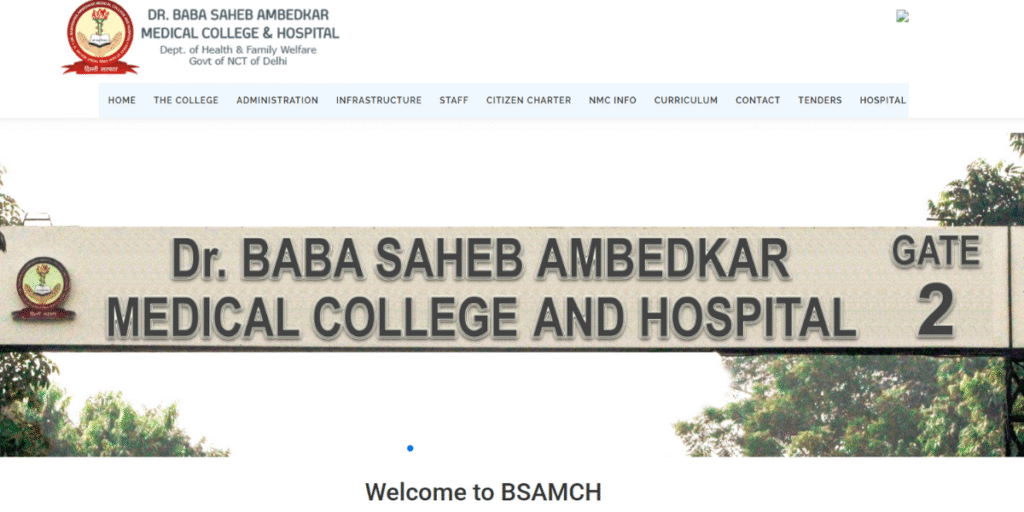
The state government established Dr. Baba Saheb Ambedkar Medical College & Hospital (BSAMCH) in 2013 to fill the increasing need for medical education and healthcare in Delhi. Associated with Guru Gobind Singh Indraprastha University (GGSIPU), it links straight to the Dr. Baba Saheb Ambedkar Hospital.
The college wants to give students a strong focus on skills useful in practice, caring for patients, and the latest medical techniques. Because of its advanced labs, high-tech classrooms, and progressing clinical facilities, it stands out as a promising and modern option among emerging Medical Colleges in Delhi for those aiming to study in a well-developed government medical school.
- Key Highlights:
- Newer government medical college with modern facilities.
- Affiliated with GGSIPU.
- Attached to a well-equipped hospital.
- Growing reputation in medical education.
- Subsidized fees.
- Affiliation: Guru Gobind Singh Indraprastha University (GGSIPU)
- MBBS Seats: 125
- Approximate Fees (MBBS): ₹5.5 Lakhs – ₹6.0 Lakhs (total for the entire course, subsidized)
- NEET Cut-off (Previous Year Trends – General Category All India Rank): Expected to be around 5000-8000 for AIQ, higher for State Quota.
- USP: A promising newer institution with rapidly developing infrastructure and a commitment to quality medical training.
7. Atal Bihari Vajpayee Institute of Medical Sciences (ABVIMS) & Dr. Ram Manohar Lohia Hospital, Delhi
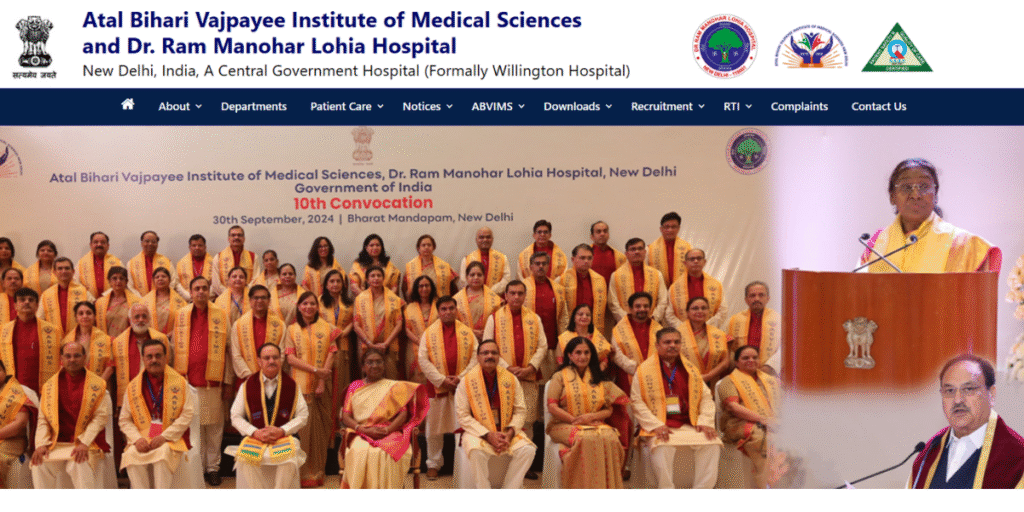
Opened in 2019, Atal Bihari Vajpayee Institute of Medical Sciences (ABVIMS) is the latest government medical college that works with the important Dr. Ram Manohar Lohia Hospital. Guru Gobind Singh Indraprastha University (GGSIPU) is the expedition’s affiliating body. Dr. RML Hospital’s massive clinical experience and the large number of patients help the institute greatly.
ABVIMS plans to support excellent medical training and support research in various areas of medicine, using the professional skills and excellent equipment in the hospital. As one of the newer Medical Colleges in Delhi, it benefits from modern teaching methods and technology, helping it stay current with medical education trends.
- Key Highlights:
- Newly established government medical college.
- Associated with the renowned Dr. Ram Manohar Lohia Hospital.
- Affiliated with GGSIPU.
- Focus on quality education and research.
- Subsidized fees.
- Affiliation: Guru Gobind Singh Indraprastha University (GGSIPU)
- MBBS Seats: 100
- Approximate Fees (MBBS): ₹1.5 Lakhs – ₹1.6 Lakhs (total for the entire course, subsidized)
- NEET Cut-off (Previous Year Trends – General Category All India Rank): Expected to be around 2000-4000 for AIQ, higher for State Quota.
- USP: Leverages the excellent clinical infrastructure and patient care of a well-established hospital for practical training.
8. North Delhi Municipal Corporation Medical College (NDMC Medical College) & Hindu Rao Hospital, Delhi
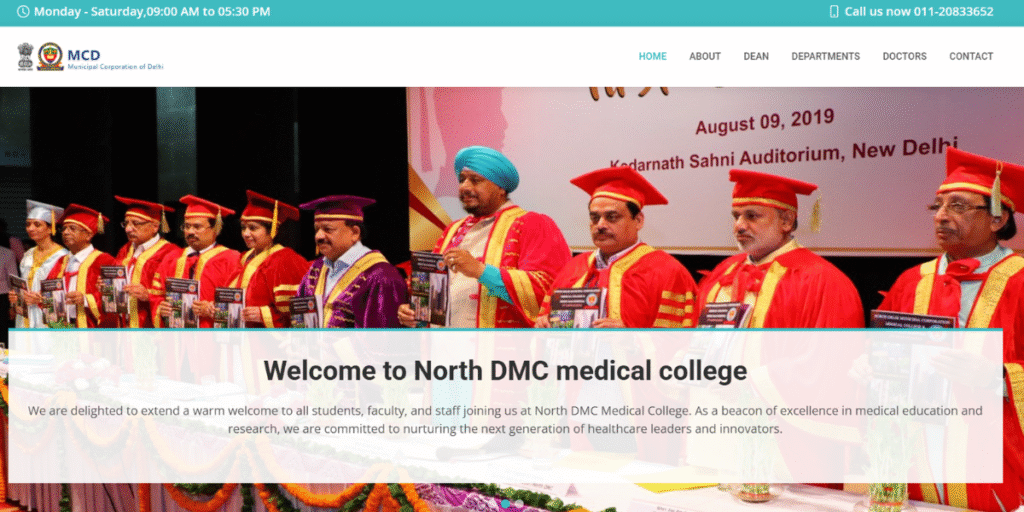
NDMC Medical College is a government medical college linked to Hindu Rao Hospital, which belongs to the North Delhi Municipal Corporation and is one of the oldest and biggest multi-specialty hospitals in the area. The college was formed under Guru Gobind Singh Indraprastha University (GGSIPU) to provide better learning experiences and improved medical support in North Delhi.
As one of the notable Medical Colleges in Delhi, it gives students chances to work in associated hospitals that handle a large urban community and present a broad range of medical cases. While acting as a municipal college, it still maintains high standards and allows students with limited means to gain admission to a Delhi government institution, supporting local healthcare.
- Key Highlights:
- Government medical college with affiliation to GGSIPU.
- Associated with a historical hospital, Hindu Rao Hospital.
- Focus on local healthcare needs.
- Affordable fee structure.
- Affiliation: Guru Gobind Singh Indraprastha University (GGSIPU)
- MBBS Seats: 60 (Subject to change, check official sources)
- Approximate Fees (MBBS): ₹2.25 Lakhs – ₹2.5 Lakhs (total for the entire course, subsidized)
- NEET Cut-off (Previous Year Trends – General Category All India Rank): Expected to be around 10000-15000 for AIQ, higher for State Quota.
- USP: Provides opportunities for medical education within the municipal healthcare system, serving a large urban population.
9. Hamdard Institute of Medical Sciences & Research (HIMSR), Delhi
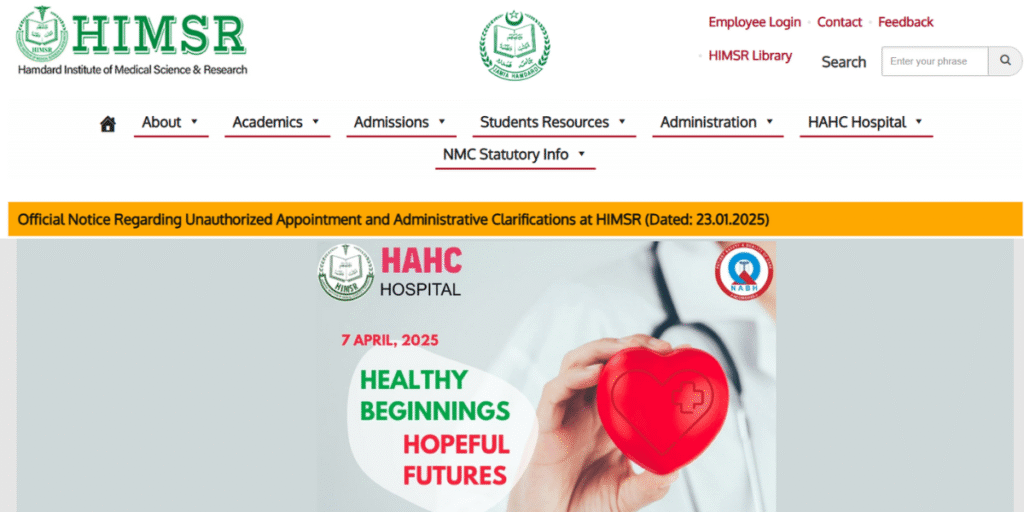
One of the leading private medical schools in India, the Hamdard Institute of Medical Sciences & Research (HIMSR), is located on the large campus of Jamia Hamdard in Delhi. Both the National Medical Commission (NMC) and the deemed university it belongs to recognize and offer MBBS and postgraduate courses at this institute.
HIMSR intends to give students a strong foundation in medicine with plenty of emphasis on research, ethics and caring for the body, mind and soul. It offers access to state-of-the-art labs and simulation centers, a digital library and the Hakeem Abdul Hameed Centenary Hospital where students learn a lot about treating patients. Being a private institution allows it to concentrate on students’ needs and supply up-to-date resources which appeals to those looking for a strong and well-equipped medical program.
- Key Highlights:
- Reputable private medical college.
- Part of Jamia Hamdard (Deemed to be University).
- Modern infrastructure and facilities.
- Emphasis on research and ethical practice.
- Good patient exposure through its teaching hospital.
- Affiliation: Jamia Hamdard (Deemed to be University)
- MBBS Seats: 150
- Approximate Fees (MBBS): ₹70.0 Lakhs – ₹75.0 Lakhs (total for the entire course, significantly higher than government colleges)
- NEET Cut-off (Previous Year Trends – General Category All India Rank): Expected to be around 30000-60000.
- USP: Offers a high-quality private medical education experience with modern amenities and a focus on holistic development within a deemed university framework.
10. Army College of Medical Sciences (ACMS), Delhi
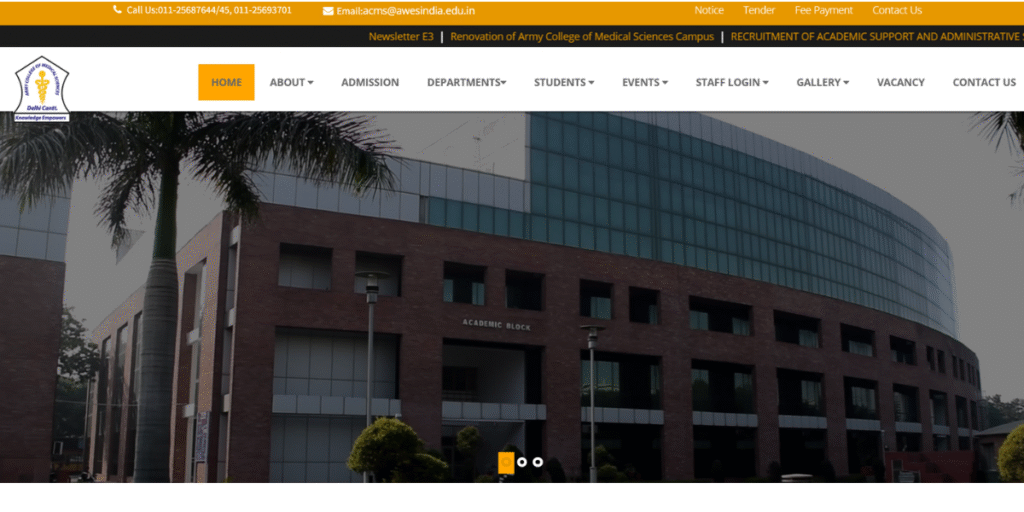
The Army College of Medical Sciences (ACMS), situated in Delhi Cantt, serves the children of those serving and retired from the Army. It is a private school, but there is a specific process to enroll Army wards and discipline and military culture play a major role, giving it its own character.
ACMS is with Guru Gobind Singh Indraprastha University (GGSIPU) and linked to Base Hospital Delhi Cantt, creating many chances for students to work alongside top professionals in a large military hospital. Because the college gives students access to modern resources, a disciplined setting and outstanding mentorship, it is the top pick for the group it is designed for.
- Key Highlights:
- Private college primarily for Army wards.
- Affiliated with GGSIPU.
- Attached to Base Hospital Delhi Cantt for clinical training.
- Disciplined learning environment with military ethos.
- Good infrastructure.
- Affiliation: Guru Gobind Singh Indraprastha University (GGSIPU)
- MBBS Seats: 100
- Approximate Fees (MBBS): ₹14.0 Lakhs – ₹15.0 Lakhs (total for the entire course)
- NEET Cut-off (Previous Year Trends – General Category All India Rank): Varies significantly due to specific eligibility criteria for Army wards; for civilian students (if seats are available), it would be relatively higher.
- USP: Offers a unique opportunity for wards of Army personnel to pursue medical education.
Factors to Consider When Choosing a Medical College in Delhi
Your decision about where to study medicine is highly important. You should think about these factors:
- NEET UG Rank and Score: To decide which colleges you can attend, the marks and rank you get in NEET UG are very important. Get the best score you are capable of to open up all the best possibilities.
- Fees and Budget: Government institutions impose much lower costs while attending one can cost more in private institutions. Make sure you are able to pay the expenses before buying.
- Affiliation and Recognition: Verify that the college is accredited by the National Medical Commission (NMC) and that it is recognized by a known university (Delhi University or Guru Gobind Singh Indraprastha University).
- Infrastructure and Facilities: Review the places where you will study, do experiments, use books and computers and live by looking at the campus’ infrastructure and accommodation.
- Associated Hospital and Clinical Exposure: The connected hospital has the primary role of providing diverse and sufficient exposure to clinical cases. Treating more patients from a wider spectrum of cases improves how much you learn in practice.
- Faculty Expertise and Experience: Check the faculty’s education, background and what they have published. For students to learn well, it is necessary to have experienced and dedicated staff.
- Alumni Network and Reputation: Good alumni connections can help people advance and receive mentoring in their careers. The college’s standing among doctors and medical professionals also matters.
Eligibility Criteria for MBBS Admission in Delhi
If you want to get MBBS admission in Delhi’s medical colleges for 2025-26, you have to fulfill the following requirements.
Nationality: Indian Nationals, Non-Resident Indians (NRIs), Overseas Citizen of India (OCIs), Persons of Indian Origin (PIOs) and Foreign Nationals are qualified for the program.
Age Limit: A candidate should be at least 17 years old by December 31, 2025. NEET UG has no restriction on the age of candidates.
Educational Qualification:
- There is a requirement that candidates have passed 10+2 (or equivalent) with Physics, Chemistry, Biology/Biotechnology and English as core subjects.
- Minimum required mark to pass 10+2
- You must get 50% or more in Physics, Chemistry and Biology/Biotechnology to be eligible.
- For SC/ST/OBC (NCL) applicants, the minimum requirement is 40% aggregate in Physics, Chemistry and Biology/Biotechnology.
- To be eligible for PwBD (General Category), you must have a minimum of 45% aggregate score in Physics, Chemistry and Biology/Biotechnology.
NEET UG Qualification:
- The NEET UG Qualification entry indicates that the applicant needs to have cleared the National Eligibility and Entrance Test (UG) to be eligible for the course.
- All applicants must get an NEET UG 2025 score equal to or higher than the minimum qualification percentile to be qualified.
Domicile (applicable for State Quota):
- If you wish to use 85% of the reserved state seats, you must usually finish 11th and 12th schooling at a Delhi school. The proper domicile rules for Delhi differ and must be looked up with guidance from the state counseling authority.
Conclusion
The many medical colleges in Delhi provide many excellent opportunities for new doctors. Many students choose Delhi for medical training because it offers every option, including AIIMS Delhi, MAMC, LHMC, VMMC, UCMS and private institutions such as HIMSR and ACMS. Becoming a doctor in Delhi starts with doing well in NEET UG, then carefully arranging for the counselling sessions.
If students look closely at the fees, the amount of training they will receive, how skilled the faculty are and the admission rules, they will increase their opportunities to enroll in an MBBS course at a recognized medical institute in India. To be successful and impactful in healthcare, a person must be devoted and caring and that can be learned at Delhi’s top medical institutions. Similarly, those interested in media and communication can explore top Journalism Colleges in India to build a strong foundation in reporting, storytelling, and ethical journalism.
FAQs
Does a student need to pass NEET UG to apply for MBBS in Delhi?
Students are required to pass NEET UG in order to get into any MBBS courses in Delhi, government or private.
Approximately what is the cost of pursuing MBBS at government medical colleges in Delhi?
Fees in government medical colleges in Delhi are very affordable, since they start at a few thousand rupees and go up to about a couple of lakhs for the duration of the course.
What are some of the top colleges in Delhi for medical students?
AIIMS, ACMS, VMMC and many other colleges are some of the best colleges in Delhi.
In Delhi, what’s the main difference between All India Quota (AIQ) and State Quota?
AIQ is reserved for 15% of candidates around the country, while State Quota is for 85% of candidates who comply with Delhi domicile rules.

